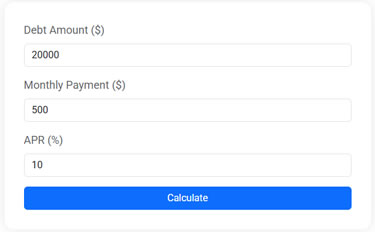The Link Between Debt Management and Mental Health

The article emphasizes the significant impact of debt on mental health, highlighting how financial stress can lead to psychological issues such as anxiety and depression, creating a vicious cycle that affects both mental well-being and financial management. It suggests that breaking this cycle requires a dual approach, addressing both financial and mental health through strategies like budgeting, debt consolidation, seeking professional help, and building support systems. Additionally, the article underscores the importance of financial education in empowering individuals to make informed decisions, reducing stress, and fostering a healthier relationship with money.
Imagine this: you’re lying in bed, staring at the ceiling, and the only thing you can think about is the mountain of bills waiting on your kitchen table. Your mind races with thoughts of interest rates and minimum payments. If this sounds familiar, you're not alone. Debt isn't just a financial burden; it can also deeply affect our mental well-being. Many individuals find themselves trapped in a cycle where financial stress leads to mental health struggles, which in turn make it even harder to manage their finances effectively.
This isn't merely anecdotal. Research from the American Psychological Association consistently shows that money is a top source of stress for Americans, and this stress can manifest in mental health issues such as anxiety and depression. But there is hope. By recognizing the link between debt management and mental health, we can work towards breaking this cycle. Here's how addressing both can lead to a more balanced and healthier life.
The Psychological Toll of Debt
Debt can feel like a heavy weight on your shoulders, one that doesn't just affect your wallet but also your mind. Financial stress can lead to feelings of helplessness and shame, which are powerful triggers for anxiety and depression. In a study published in the journal Clinical Psychology Review, researchers found that people with debt are three times more likely to experience mental health problems than those without. This isn't just about the numbers; it's about the human cost of financial distress.
Consider Michelle, a single mother working two jobs to make ends meet. Her debt isn't just a line on a spreadsheet; it's a constant source of anxiety. "I worry every day about what happens if I get sick," she says. "Will I be able to pay my bills? What if my car breaks down?" For many like Michelle, debt isn't just a financial issue—it's a mental one, too.
The Vicious Cycle: Debt and Mental Health
Debt and mental health issues often feed into each other, creating a vicious cycle. When you're stressed about money, your mental health can suffer. And when your mental health is compromised, it can be even harder to manage your finances. This cycle can feel impossible to break, but understanding it is the first step towards change.
As financial advisor Jane Smith explains, "When people are overwhelmed by their financial situation, they might avoid opening bills or checking their bank accounts. This avoidance can lead to missed payments, late fees, and even more stress." It's a downward spiral that can quickly get out of control, making it crucial to address both aspects simultaneously.
Debt Payoff Calculator
Plan your financial future by estimating how long it will take to pay off your debt based on your balance, annual percentage rate (APR), and monthly payment. After entering your figures, the calculator determines the number of months needed to fully repay the debt and calculates the total interest paid over time.
Strategies for Breaking the Cycle
To break free from the cycle of debt and poor mental health, a dual approach is necessary. This means tackling both the financial and psychological aspects head-on. Creating a realistic budget is a good starting point. By laying out your income and expenses, you can identify areas where you can cut back and start making a plan for paying down debt. Budgeting might sound basic, but it can be empowering when done thoughtfully.
Debt consolidation is another strategy that can simplify your financial situation. By combining multiple debts into a single payment, you can often secure a lower interest rate, making it easier to manage what you owe. This approach can provide immediate relief by reducing the number of payments you need to keep track of each month.
Seeking professional help is also a crucial step. Financial counselors can offer guidance on managing debt, while mental health professionals can provide support for the psychological impacts. Organizations like the National Foundation for Credit Counseling offer resources that can help you take control of your financial situation, and therapy can offer a safe space to process the emotions that come with it.
The Role of Support Systems
Having a strong support system can make all the difference when dealing with debt and mental health issues. Reach out to friends or family members who can offer emotional support and practical advice. Sometimes, just having someone to talk to can alleviate the burden you’re carrying.
Support groups, both in-person and online, can also provide a sense of community and shared understanding. Platforms like Reddit have forums dedicated to debt management where individuals share their experiences, offer advice, and celebrate each other's successes. Knowing you’re not alone in your struggle can be incredibly comforting.
Empowering Through Financial Education
Finally, education is a powerful tool in reducing financial stress. By understanding the basics of personal finance, you can make informed decisions that prevent debt from spiraling out of control. Financial literacy programs, often offered by community centers or online platforms, can teach you how to budget effectively, understand credit scores, and plan for the future.
As CNBC reports, "Financial education empowers individuals to take control of their financial futures, reducing stress and fostering a healthier relationship with money." By investing time in learning about personal finance, you’re investing in your mental health as well.
While the link between debt and mental health is undeniable, it's important to remember that change is possible. By addressing both financial and psychological aspects, you can break the cycle and work towards a more balanced life. It’s not an easy journey, but with the right tools and support, it’s a journey worth taking.








